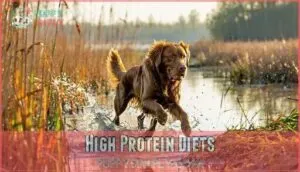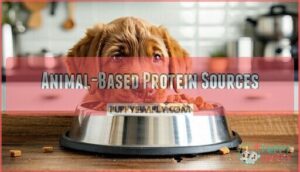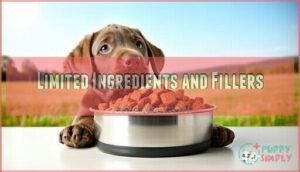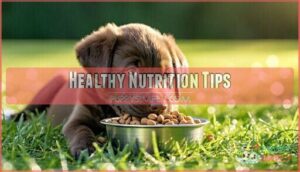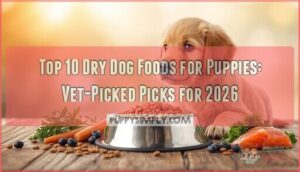This site is supported by our readers. We may earn a commission, at no cost to you, if you purchase through links.

These water-loving athletes require high-protein formulas with real meat as the first ingredient to fuel their boundless energy.
Look for foods containing glucosamine and chondroitin to support their hardworking joints, plus omega fatty acids to keep that gorgeous double coat healthy and water-repellent.
Avoid fillers like corn and wheat that don’t pack the nutritional punch your Chessie deserves.
Premium brands like Instinct, Royal Canin, and Purina Pro Plan Sport offer targeted nutrition for large, active breeds.
The right choice depends on your dog’s age, activity level, and any health considerations your vet has identified.
Table Of Contents
- Key Takeaways
- Choosing Best Dog Food
- Chesapeake Bay Retriever Needs
- Top 10 Dog Foods
- Instinct Raw Bites Beef Dog Food
- Royal Canin HP Protein Dog Food
- Blue Buffalo Dog Food
- Hills Science Diet Dog Food
- American Journey Salmon Sweet Potato Dog Food
- Merrick Grain Free Puppy Dog Food
- Nutro Ultra Senior Dog Food
- Purina ONE Plus Healthy Weight Dog Food
- Purina Pro Plan Sport Dog Food
- Taste Wild High Prairie Dog Food
- Dog Food Qualities Matter
- Feeding and Switching Food
- Healthy Nutrition Tips
- Frequently Asked Questions (FAQs)
- Do Chesapeake Bay Retrievers have sensitive stomachs?
- What two breeds make a Chesapeake Bay Retriever?
- How much should I feed my Chesapeake Bay Retriever?
- What is the best dog food for retrievers?
- How often should I feed my Chesapeake Bay Retriever?
- What human foods are toxic to Chesapeakes?
- How much water should my Chesapeake drink daily?
- Do Chesapeakes need different winter feeding schedules?
- Conclusion
Key Takeaways
- You’ll need high-protein dog food (22-26%) with real meat as the first ingredient to fuel your Chesapeake’s active lifestyle and support their muscular build.
- Look for formulas containing glucosamine and chondroitin to protect your dog’s joints, since Chesapeakes are prone to hip dysplasia and other joint issues from their water work.
- Choose foods with omega-3 and omega-6 fatty acids to maintain your Chesapeake’s water-repellent double coat and support overall skin health.
- You’ll want to avoid fillers like corn, wheat, and soy that don’t provide the nutritional density your high-energy retriever needs for peak performance.
Choosing Best Dog Food
Finding the right dog food for your Chesapeake Bay Retriever starts with understanding their unique needs and life stage.
You’ll want to match their food to their age, health conditions, activity level, and weight to keep them thriving.
Consider Age and Health
When selecting food for your Chesapeake Bay Retriever, age determines everything.
Puppy nutrition requires 22% protein for growth, while adult maintenance needs 18-26%.
Senior diets focus on joint support and lower calories.
Health conditions like hip dysplasia need glucosamine supplements.
Weight management becomes essential as these dogs age, preventing obesity-related issues.
Senior dogs benefit from controlled calorie intake to avoid weight gain.
Consider Activity Level and Weight
Your Chesapeake Bay Retriever’s energy requirements depend on their daily activity level and current weight.
Active dogs need high-calorie diets with quality protein, while less active pets require portion control to prevent weight gain.
Monitor your dog’s body condition regularly and adjust calorie intake accordingly.
Exercise impact directly affects their nutritional needs, so choose active dog food formulas that match their lifestyle for ideal weight management.
Chesapeake Bay Retriever Needs
Your Chesapeake Bay Retriever needs specific nutrition to support their active lifestyle and breed-specific health concerns.
These powerful water dogs require high-protein diets and joint support supplements to maintain their muscular build and prevent common issues like hip dysplasia.
High Protein Diets
Your chesapeake bay retriever thrives on high protein food that fuels muscle development and sustains energy levels.
Active dog food with 22-25% protein supports their working nature while providing satiety benefits that prevent overeating.
Quality protein sources like chicken, beef, and fish enhance retriever nutrition and address digestion concerns.
This powerhouse breed needs fuel that matches their drive.
They’re also prone to hip and joint issues.
Joint Support and Supplements
Beyond protein needs, your Chesapeake Bay Retriever requires targeted joint support supplements.
Glucosamine Benefits include cartilage repair, while Chondroitin Sources help maintain joint fluid. Omega-3s reduce Joint Inflammation naturally.
Look for breed-specific food containing glucosamine chondroitin for ideal joint health. Many owners purchase dog joint supplements for added support.
Proper Supplement Dosage varies by weight, so consult your vet for joint support recommendations.
Top 10 Dog Foods
Finding the right food for your Chesapeake Bay Retriever can feel overwhelming with so many options available.
We’ve narrowed down the top 10 dog foods that meet your Chessie’s specific nutritional needs for ideal health and energy.
Instinct Raw Bites Beef Dog Food
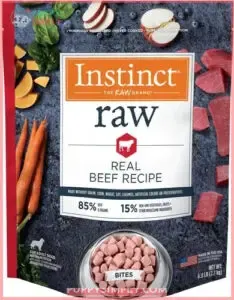
Instinct Raw Bites delivers freeze-dried nutrition that’s perfect for your Chesapeake Bay Retriever’s active lifestyle.
Freeze-dried nutrition meets your active Chesapeake’s energy demands head-on.
This beef protein source maintains nutritional value through gentle processing, creating versatile bites you can serve as meals or toppers.
Here’s what makes Raw Bites Benefits stand out:
- Pure beef protein – Single-ingredient formula supports muscle development
- Freeze-dried nutrition – Locks in nutrients without artificial preservatives
- Bites versatility – Use as complete meals, toppers, or training treats
- Ingredient quality – Human-grade beef with no fillers or by-products
- Easy preparation – Just add water for complete rehydration
Royal Canin HP Protein Dog Food
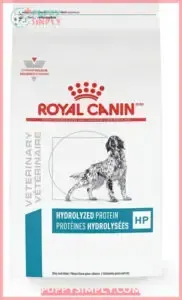
Often overlooked by dog food brands, Royal Canin’s HP (Hydrolyzed Protein) formula tackles allergy management head-on for your chesapeake bay retriever.
This veterinary recommendation uses protein hydrolysate to break down allergens into smaller, less reactive pieces.
While palatability concerns exist due to ingredient sourcing methods, it’s proven effective for dogs with food sensitivities.
Blue Buffalo Dog Food
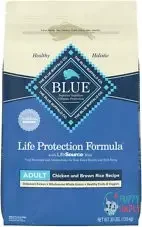
Blue Buffalo stands out as a solid choice for your Chesapeake Bay Retriever, delivering real deboned chicken as the first ingredient.
You’ll appreciate the 24% minimum protein content that supports your dog’s muscular build and active lifestyle.
The LifeSource Bits provide targeted antioxidants, vitamins, and minerals for immune support.
With omega-3 and omega-6 fatty acids promoting healthy skin and coat, plus glucosamine for joint health, this formula addresses your retriever’s specific needs.
The absence of corn, wheat, and artificial preservatives makes it easier on sensitive stomachs while maintaining excellent nutritional value.
Best For: Active adult dogs like Chesapeake Bay Retrievers needing high-quality protein, joint support, and immune-boosting nutrition.
- Real deboned chicken is the first ingredient for muscle maintenance.
- Contains targeted antioxidants and essential nutrients from LifeSource Bits.
- Free from corn, wheat, and artificial preservatives, supporting sensitive stomachs.
- Not specifically formulated for weight management or grain-free diets.
- Packaging may vary, which can be confusing for some buyers.
- Premium ingredients make it pricier than some other dog food brands.
Hills Science Diet Dog Food
Hills Science Diet stands out among dog food brands with its vet recommended formulas backed by nutritional research.
You’ll find options suited to each life stage, from puppy growth to senior care.
Their recipes focus on digestive health through easily absorbed ingredients and controlled fiber levels.
For your Chesapeake Bay Retriever, Hills offers weight control formulas with high-quality protein that support muscle maintenance while managing calories.
The brand’s ingredient quality meets strict standards, making it a reliable choice for your dog’s long-term health.
American Journey Salmon Sweet Potato Dog Food
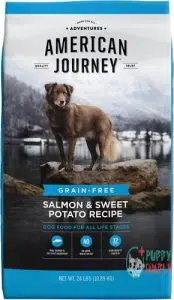
With salmon taking center stage as the primary ingredient, American Journey delivers the protein punch your Chesapeake Bay Retriever craves.
This grain-free formula packs 32% protein and includes glucosamine and chondroitin for joint support—essential for active retrievers prone to hip issues.
The omega fatty acids from salmon oil promote a lustrous coat, while sweet potatoes provide sustained energy.
At 390 calories per cup, it’s perfectly portioned for working breeds, though it contains some synthetic additives, the balanced nutrition and affordable price make it a solid choice for health-conscious owners.
Best For: Active adult dogs like Chesapeake Bay Retrievers who need high protein, joint support, and have grain sensitivities.
- Contains synthetic additives that may concern some owners.
- Made with feed-grade—not human-grade—ingredients.
- May have trace amounts of grains due to the facility’s production process.
- Real salmon is the primary ingredient, supporting muscle and coat health.
- Grain-free and free from common allergens like corn, wheat, or soy.
- Added glucosamine and chondroitin to promote joint health in active breeds.
Merrick Grain Free Puppy Dog Food
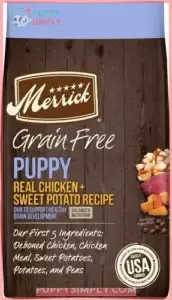
Merrick Grain Free Puppy Dog Food delivers premium nutrition for your growing Chesapeake Bay Retriever pup.
This puppy food meets AAFCO Compliance standards with real deboned chicken as the first ingredient.
Here’s what makes it stand out:
- 98% of protein comes from animal sources – supporting healthy puppy development
- Zero grains or gluten – reducing digestibility concerns for sensitive stomachs
- Added DHA and probiotics – boosting brain development and gut health
Brand comparison shows Merrick excels in ingredient analysis, using whole foods over fillers.
Nutro Ultra Senior Dog Food

Your senior Chesapeake Bay retriever deserves Nutro Ultra’s Senior-Specific Formula that addresses aging concerns.
This senior dog food combines three protein sources with joint health ingredients like glucosamine. The ingredient analysis shows real chicken, lamb, and salmon as primary proteins.
While palatability concerns exist with some dogs, most seniors enjoy the taste. AAFCO compliance guarantees complete nutrition for your aging companion’s needs, ensuring a healthy life with complete nutrition.
Purina ONE Plus Healthy Weight Dog Food
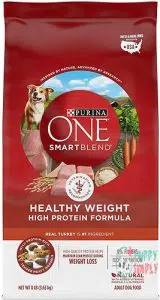
Managing your Chesapeake Bay Retriever’s weight doesn’t mean compromising on nutrition.
Purina ONE Plus Healthy Weight Dog Food delivers high-quality protein while controlling calorie content to support weight management. This AAFCO-compliant formula includes fiber benefits that help your dog feel satisfied longer.
Key features for Chesapeake Bay Retrievers:
- Reduced calories – 15% fewer calories than regular Purina ONE formulas
- Real chicken protein – Maintains muscle mass during weight loss
- Natural fiber blend – Promotes healthy digestion and satiety
Purina Pro Plan Sport Dog Food
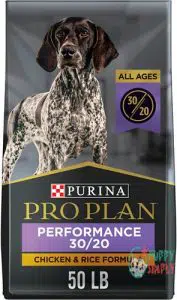
Your active Chesapeake Bay Retriever deserves fuel that matches their energy.
Purina Pro Plan Sport Formula delivers high-quality protein content specifically designed for active dogs.
This AAFCO Standards-compliant dog food supports your dog’s activity level with premium ingredient analysis.
The formula helps maintain dog health while providing the nutrients hardworking retrievers need for peak performance.
Taste Wild High Prairie Dog Food
With buffalo as the protein source quality, Taste Wild High Prairie dog food delivers high-quality protein your Chesapeake Bay retriever needs.
This grain-free dog food meets AAFCO compliance standards while offering digestive benefits through probiotics.
The recipe suits active breeds perfectly, providing sustained energy for those weekend hunting trips, and dog food reviews consistently praise its breed suitability and natural ingredients.
Dog Food Qualities Matter
When you’re shopping for Chesapeake Bay Retriever food, the ingredients list tells the whole story.
You’ll want to see real meat like chicken, beef, or fish as the first ingredient, not mysterious by-products or plant fillers that leave your pup still hungry after dinner.
Animal-Based Protein Sources
Quality meat quality sets your Chesapeake Bay Retriever up for success.
Real animal proteins deliver complete amino acids that plant sources can’t match. Protein digestibility from chicken, beef, and fish surpasses alternatives, supporting muscle development in active dogs.
Animal proteins are more bioavailable, ensuring dogs benefit fully from amino acids.
Look for these essential amino acids:
- Source variety – Multiple meats broaden amino acid profiles
- Meat meals – Concentrated, high-quality protein sources
- Organ meats – Natural multivitamins packed with nutrients
- First ingredient – Real meat should top the list
Limited Ingredients and Fillers
Beyond protein quality, you’ll want to avoid filler ingredients that offer little nutritional value.
Your chesapeake bay retriever deserves better than corn, wheat, and soy fillers that can trigger allergies.
A limited ingredient diet helps identify problem foods while supporting better digestibility concerns.
| Avoid These Fillers | Choose Instead |
|---|---|
| Corn, wheat, soy | Named meat proteins |
| Animal by-products | Whole meats, organs |
| Artificial additives | Natural preservatives |
| Generic "meat meal" | Specific sources (chicken meal) |
Quality ingredient sourcing matters for your dog’s health.
Grainfree dog food isn’t automatically better, but fewer fillers mean higher nutritional value per bite.
You can find a variety of options for dog food online.
Feeding and Switching Food
When you’re ready to switch your Chesapeake Bay Retriever to a new food, take it slow to avoid stomach upset.
A gradual seven-day conversion works best, mixing increasing amounts of the new food with decreasing amounts of the old food.
While watching for any digestive issues, this approach ensures a smooth transition, making it a seven-day conversion that works best.
Gradual Transition to New Food
When switching your Chesapeake Bay Retriever’s food, patience prevents digestive upheaval.
Start with a seven-day adaptation timeline, mixing 25% new food with 75% current food for two days.
Gradually increase the new food ratio while monitoring stool consistency and watching for allergy symptoms.
A proper approach to food transition products can further ease this change.
This digestive adaptation period helps avoid palatability concerns and confirms smooth health dietary changes without veterinary recommendations, ensuring a smooth transition.
Monitoring Health and Adjusting Diet
Once you’ve switched your Chesapeake Bay Retriever to new dog food, watch how they respond.
Your dog’s body tells the story of whether the change is working.
Keep track of these key indicators:
- Weight Fluctuation – Weekly weigh-ins help spot gradual changes
- Allergy Symptoms – Look for itching, redness, or digestive upset
- Coat Condition – Healthy shine means good nutrition absorption
Monitor stool consistency and energy levels daily.
If your Chesapeake shows concerning changes, consult your vet about health dietary changes before problems worsen.
Healthy Nutrition Tips
You’ll want to work with your vet to create a nutrition plan that fits your Chesapeake’s specific needs and health status.
Getting the right balance of proteins, fats, vitamins, and minerals guarantees your dog stays healthy throughout their life stages.
Consult With Veterinarian
Always check with your veterinarian before making dietary adjustments for your Chesapeake Bay Retriever.
They’ll assess breed predispositions like hip dysplasia and hypothyroidism, recommend supplement advice for joint health, and guide weight management strategies.
Your vet knows your dog’s health history best and can suggest the right breed-specific food or breed-specific diet modifications for ideal health monitoring.
Balance Nutrients and Vitamins
Your vet’s guidance sets the foundation for proper canine nutrition. Balance nutrients and vitamins carefully for your Chesapeake Bay Retriever’s ideal health. Quality breed-specific food with balanced ratios supports their active lifestyle.
Essential vitamin sources and mineral importance include:
- Protein balance: 22-26% from animal sources for muscle maintenance
- Omega fatty acids: Support joint health and coat shine
- Calcium-phosphorus ratios: 1.2:1 for proper bone development
- B-complex vitamins: Boost energy metabolism and immune function
- Antioxidants: Protect against cellular damage from exercise
Monitor supplement timing with holistic nutrition approaches. Understanding the importance of supplement ingredient authenticity is vital for ensuring your dog’s safety. Quality dog food ingredients matter more than fancy marketing claims.
Frequently Asked Questions (FAQs)
Do Chesapeake Bay Retrievers have sensitive stomachs?
Chesapeake Bay Retrievers don’t typically have sensitive stomachs, but they’re prone to bloat.
You’ll want to feed smaller, frequent meals and avoid exercise right after eating to prevent this serious condition.
What two breeds make a Chesapeake Bay Retriever?
The Chesapeake Bay Retriever isn’t a crossbreed of two specific breeds.
You’re looking at a breed that developed naturally from dogs shipwrecked off Maryland’s coast in the 1800s, likely including Newfoundlands and local retrievers.
How much should I feed my Chesapeake Bay Retriever?
Ironically, feeding your beloved companion shouldn’t be a guessing game!
Feed adult Chesapeake Bay Retrievers 5-3 cups of high-quality dry food daily, split into two meals.
Adjust portions based on your dog’s weight, activity level, and age for ideal health.
What is the best dog food for retrievers?
Look for high-protein foods with real meat as the first ingredient.
Choose brands like Open Farm, Sundays, or Blue Buffalo that meet AAFCO standards and support your retriever’s active lifestyle and joint health.
How often should I feed my Chesapeake Bay Retriever?
Adult dogs typically eat twice daily—studies show 23% fewer digestive issues with scheduled feeding versus free-feeding.
Feed your Chesapeake Bay Retriever twice daily, spacing meals 8-12 hours apart to prevent bloat and maintain steady energy levels, following a schedule that supports their health.
What human foods are toxic to Chesapeakes?
Never feed your Chesapeake chocolate, grapes, raisins, onions, garlic, xylitol, or avocado. These foods can cause serious poisoning, organ failure, or death in dogs.
How much water should my Chesapeake drink daily?
Dogs need about one ounce of water per pound of body weight daily. Your 60-pound Chesapeake should drink roughly 5 cups of water each day to stay properly hydrated.
Do Chesapeakes need different winter feeding schedules?
Yes, Chesapeakes typically need 10-20% more calories during winter months if they’re active outdoors. Their dense double coat and water work increase energy needs in cold weather.
Conclusion
Studies show that Chesapeake Bay Retrievers consume nearly 30% more calories than average dogs due to their high activity levels.
Selecting the best dog food for Chesapeake Bay Retrievers requires matching their unique energy demands with quality nutrition.
You’ll want high-protein formulas with real meat, joint-supporting ingredients, and omega fatty acids for coat health.
Remember to switch gradually between foods and consult your vet for personalized recommendations.
The right choice keeps your water-loving athlete healthy and thriving.
- https://iheartdogs.com/best-dog-foods-for-chesapeake-bay-retrievers-with-no-fillers/
- https://www.petabolix.com/dog-breed-nutrition/dog-food-for-chesapeake-bay-retrievers
- https://www.thefarmersdog.com/breed/chesapeake-bay-retriever
- https://www.prodograw.com/raw-feeding-guide/chesapeake-bay-retriever-feeding-guide/
- https://www.webmd.com/pets/dogs/what-to-know-about-chesapeake-bay-retrievers

